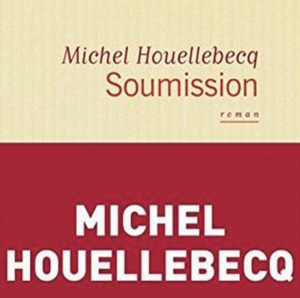
★★★★☆
Michel Houellebecq’s newest novel, “Submission” has already made gigantic waves in France as perhaps the most controversial book of the year. The novel, which revolves around a democratic Islamic takeover of France, was published in French on Jan. 7, the same day as the Charlie Hebdo shooting. Houellebecq was featured on the cover of that week’s issue. The novel has been accused of Islamophobia, outright misogyny and generation of fear of France’s far-right National Front party led by Marine Le Pen. But the reality is that this book is near guaranteed to enter the literary canon once its critics have read it.
“Submission,” published in English on Sept. 10, takes its name from a literal translation of the word “Islam,” and projects a France that by 2022 has become so politically fractured that the two main political parties have become Le Pen’s National Front and a fictitious Islamic Muslim Brotherhood led by the fictional Mohammed Ben Abbes.
When Le Pen’s nativist party wins a plurality of the votes the weak Socialist Party and center-right Union Pour Un Mouvement Populaire create a “broad republican front” coalition under Ben Abbes to prevent Le Pen from taking power. The coalition makes massive concessions to the Muslim Brotherhood; women will be largely excluded from public life, education will be privatized and largely Islamic in nature, polygamy will be legalized, Islamic countries like Algeria and Morocco are courted into the European Union, and the economic program will emphasize privatization of the welfare state in order to support familial businesses.
But the book never really outright condemns any of this; rather, it is a detached portrait of how a civilization falls. Its narrator, Francois, is a professor of literature at Sorbonne III whose specialty is the 19th-century decadent writer J.K. Huysmans, who converted to Catholicism after leading a somewhat debauched life. The narrator is pretty clearly a stand-in for Houellebecq and the French intellectual class at large.
Houellebecq makes this clear to the reader at the beginning of the book when he compares literature to the other arts and concludes, “But only literature can put you in touch with another human spirit, as a whole, with all its weaknesses and grandeurs, its limitations, its pettiness, its obsessions, its beliefs; with whatever it finds moving, interesting, exciting, or repugnant.”
And this is what really makes Houellebecq’s writing so powerful. His novel is deeply reflective of the author’s philosophy and spirit, and in this the novel is supremely honest. The Muslim Brotherhood’s political program is by no means original, nor in any way necessarily Islamic. Houellebecq clearly displays that the amorality and political apathy of bourgeois French society makes it so that the new Islamic rule is not much worse than the French culture of today; in fact, it even leads France to a new diplomatically acquired empire. The new regime scorns adultery and divorce but accepts polygamy and child marriage (under the rubric of “traditional family values” and protecting the nuclear family).
We have seen similar political programs across the world, from Mike Huckabee’s anti-LGBTQ presidential campaign to Ayatollah Khomeini in Iran, and even in Le Pen’s National Front itself. Houellebecq cleverly plays on this false split between nativism and Islamism; many characters switch sides with ease, and it is never clear which side is instigating street fighting or stealing ballots. It makes no difference to Houellebecq. Paradoxically, the indifference that underpins the novel is its greatest source of energy and controversy.
Houellebecq is a masterful writer. His style is at times callous, impassionate and distant, and at other times profoundly sad, allowing the reader to find himself lost in his emptiness. The novel digresses into tangents on the nature of the universe, considerations of nihilistic suicide, the normality of viewing porn, sexual fantasies, cigarette breaks, sexual realities, 19th-century literary movements, reflections on patriarchy, criticism of soixante-huitards, arguments against humanism, cigarette breaks, debates on theism, dialogues on Nietzsche, Sartre and Camus, cigarette breaks, and wine — lots and lots of wine.
“Despite the two bottles of white Irouleguy that I drank almost entirely by myself, I found it harder and harder, and after a while almost impossible, to keep up a reasonable level of friendly conversation,” Francois notes on page 11. One wonders if this isn’t true for Houellebecq himself.
What “Submission” gives its reader goes beyond its brilliant on-the-ground view of how intelligentsia are coerced into authoritarian regimes. “Submission” forces us to consider the weakness hidden in our modern tolerance and multiculturalism, that is to say our failure to impassion ourselves against nasty political and social forces on the grounds of not offending or of “being fair and balanced.”
Houellebecq acknowledges the power of belief in society while staying at arm’s length from any -ism. “Submission” is a work of political incorrectness intent on jarring the reader out of their own submissions to reigning ideology and their will to believe. It dares them to justify not criticizing dangerous secular or religious belief. “Submission” is a novel of a 21st century where morality is relative, subjective beliefs are given appropriate value, action is impotent and to believe is to submit. Yet, this leaves of the question of why Houellebecq is passionate enough to write a novel of ideas, a novel that excoriates all and lauds none, not even itself. Perhaps “Submission” is a novel of resistance.



















